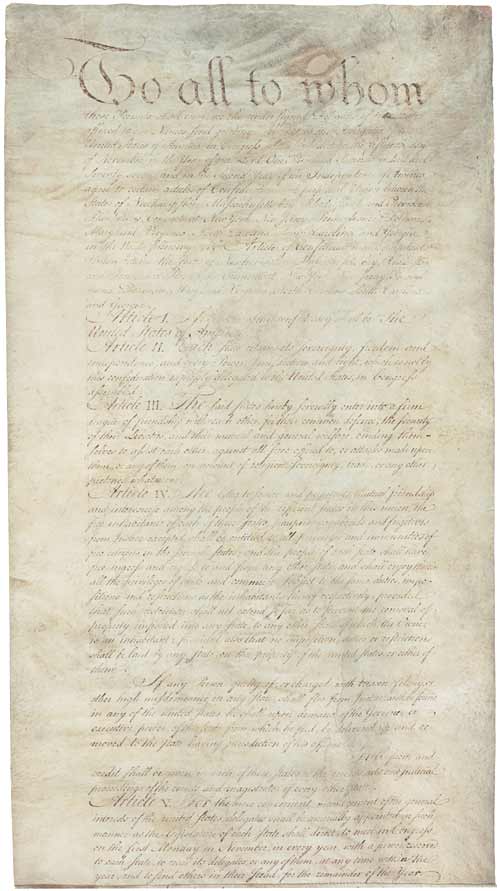|



COUNTERMAND AMENDMENT
- VIDEO
| |

ARTICLES OF CONFEDERATION
Article summaries
Even though the Articles of Confederation and the Constitution were
established by many of the same people, the two documents are very
different. The original five-page Articles contained a preamble, 13
articles, a conclusion, and a signatory section. The preamble states that
the signatory states "agree to certain articles of Confederation and
perpetual Union" between the 13 states. The following list contains short
summaries of each of the 13 articles.
-
Establishes the name of the
confederation with these words: "The Style of this confederacy shall be
'The United States of America.'"
- Asserts the sovereignty of each state,
except for the specific powers delegated to the confederation government,
i.e. "Each state retains its sovereignty, freedom, and independence, and
every power, jurisdiction, and right, which is not by this Confederation
expressly delegated."
- Not being sovereign, it does not call
the United States of America a "nation" or "government," but instead says,
"The said States hereby severally enter into a firm league of friendship
with each other, for their common defense, the security of their
liberties, and their mutual and general welfare, binding themselves to
assist each other, against all force offered to, or attacks made upon
them, or any of them, on account of religion, sovereignty, trade, or any
other pretense whatever."
- But to instill a national feeling, "[t]he
better to secure and perpetuate mutual friendship and intercourse among
the people of the different States in this union," it establishes equal
treatment and freedom
of movement for the free
inhabitants of each state to pass unhindered between the states, excluding
"paupers, vagabonds, and fugitives from
justice." All these people are entitled to equal rights established by the
state into which he travels. If a crime is committed in one state and the
perpetrator flees to another state, he will be extradited to
and tried in the state in which the crime was committed.
- Allocates one vote in the Congress
of the Confederation (the
"United States in Congress Assembled") to each state, which is entitled to
a delegation of between two and seven members. Members of Congress are
appointed by state legislatures. Also, individuals may not serve more than
three out of any six years.
- Only the central government is allowed
to conduct foreign political or commercial relations and to declare war.
No state or official may accept foreign gifts or titles, and granting any
title of nobility is forbidden to all. States are restrained from forming
sub-national groups. No state may tax or interfere with treaty
stipulations already proposed.
No state may engage in war, without permission of Congress, unless invaded
or that is imminent on the frontier; no state may maintain a peace-time
standing army or navy, unless infested by pirates, but every State is
required to keep ready, a well-regulated (meaning well trained),
disciplined, and equipped militia, with sufficient public stores of a due
number of field pieces, tents, a proper quantity of arms, ammunition and
camp equipage.
- Whenever an army is raised for common
defense, colonels and military ranks below colonel will be named by the
state legislatures.
- Expenditures by the United States of
America will be paid by funds raised by state legislatures, and
apportioned to the states based on the real property values of each.
- Defines the sole and exclusive right and
power of the United States in Congress assembled to determine peace and
war; to exchange ambassadors; to enter into treaties and alliances, with
some provisos; to establish rules for deciding all cases of captures or
prizes on land or water; to grant letters
of marque and reprisal (documents
authorizing privateers) in
times of peace; to appoint courts for the trial of pirates and crimes
committed on the high seas; to establish courts for appeals in all cases
of captures, but no member of Congress may be appointed a judge; to set
weights and measures (including coins), and for Congress to serve as a
final court for disputes between states.
- "The Committee
of the States, or any nine of them, shall be authorized to execute, in the
recess of Congress, such of the powers of Congress as the United States in
Congress assembled, by the consent of the nine States, shall from time to
time think expedient to vest them with; provided that no power be
delegated to the said Committee, for the exercise of which, by the
Articles of Confederation, the voice of nine States in the Congress of the
United States assembled be requisite."
- If "Canada" (as the British-held Province
of Quebec was also known)
accedes to this confederation, it will be admitted.
- Reaffirms that the Confederation accepts
war debt incurred by Congress before the existence of the Articles.
- Declares that the Articles are
perpetual, and can only be altered by approval of Congress with
ratification by all the state legislatures.
While still at war with Britain, the Founding Fathers were divided between
those seeking a powerful, centralized national government (the
"federalists"), and those seeking a loosely structured one (the "anti
federalists"). Jealously guarding their new independence, members of the
Continental Congress arrived at a compromise solution dividing sovereignty
between the states and the central government, with aunicameral legislature
that protected the liberty of the individual states. While calling on
Congress to regulate military and monetary affairs, for example, the
Articles of Confederation provided no mechanism with which to compel the
States to comply with requests for either troops or revenue. At times, this
left the military without adequate funding, supplies or even food.
|